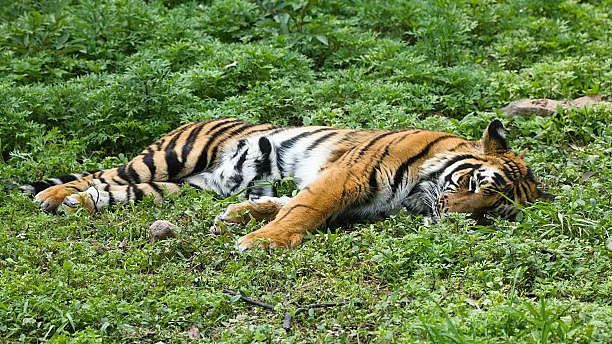In a lamentable incident, a tiger was discovered lifeless in a coffee estate in Karnataka, signaling a distressing blow to the region’s wildlife conservation efforts. The tragic discovery underscores the challenges faced by these majestic creatures in their struggle for survival amid human-dominated landscapes and the pressing need for enhanced conservation measures.
The demise of the tiger in the coffee estate highlights the complex interface between wildlife habitats and human activities. As urbanization and agricultural expansion encroach upon natural habitats, incidents like these serve as poignant reminders of the urgent need for sustainable coexistence between humans and wildlife.
The coffee estate setting, typically associated with lush landscapes and biodiversity, now becomes a site of concern as it raises questions about the potential threats faced by wildlife in such areas. It underscores the necessity for wildlife corridors and protected zones that enable the safe movement of animals, preventing incidents of conflict and facilitating their natural behaviors.
Wildlife conservation efforts in Karnataka, home to diverse flora and fauna, require ongoing commitment and vigilance. The tragic death of the tiger emphasizes the importance of implementing and enforcing robust conservation strategies, including habitat protection, anti-poaching measures, and community engagement to ensure the survival of endangered species.
Local communities, wildlife authorities, and environmental organizations play pivotal roles in safeguarding the region’s wildlife. Collaborative initiatives that promote awareness, encourage responsible land use practices, and emphasize the importance of preserving natural habitats contribute to building a harmonious relationship between humans and wildlife.
The loss of a tiger in Karnataka serves as a rallying call for increased efforts in wildlife protection and conservation. It prompts a reflection on the broader implications of human-wildlife interactions and the shared responsibility to create environments where both can thrive.
As investigations into the circumstances of the tiger’s death unfold, it becomes crucial for authorities to address potential factors contributing to such incidents. This includes evaluating the impact of habitat fragmentation, human-wildlife conflicts, and illicit activities that pose threats to the region’s rich biodiversity.
In commemorating the life of the deceased tiger, stakeholders must redouble their efforts to strengthen conservation measures, protect natural habitats, and foster a sustainable coexistence that ensures the well-being of both wildlife and communities. The tragic incident in the coffee estate underscores the fragility of our ecosystems and the imperative to act collectively to preserve the magnificent biodiversity that graces Karnataka’s landscapes.
Sponsored
FACTS Transcripts
Apply for a University document anywhere
https://www.factstranscript.com
Quick Transcripts for popular Universities, check your University name now and get started. We help you to get your transcript application online which is accepted for use of IRCC.
No DD, NO Paperwork. 100% Authentic, Reliable.
FACTS Transcripts Charges · Reviews · Assam Universities · Home · Know your University










